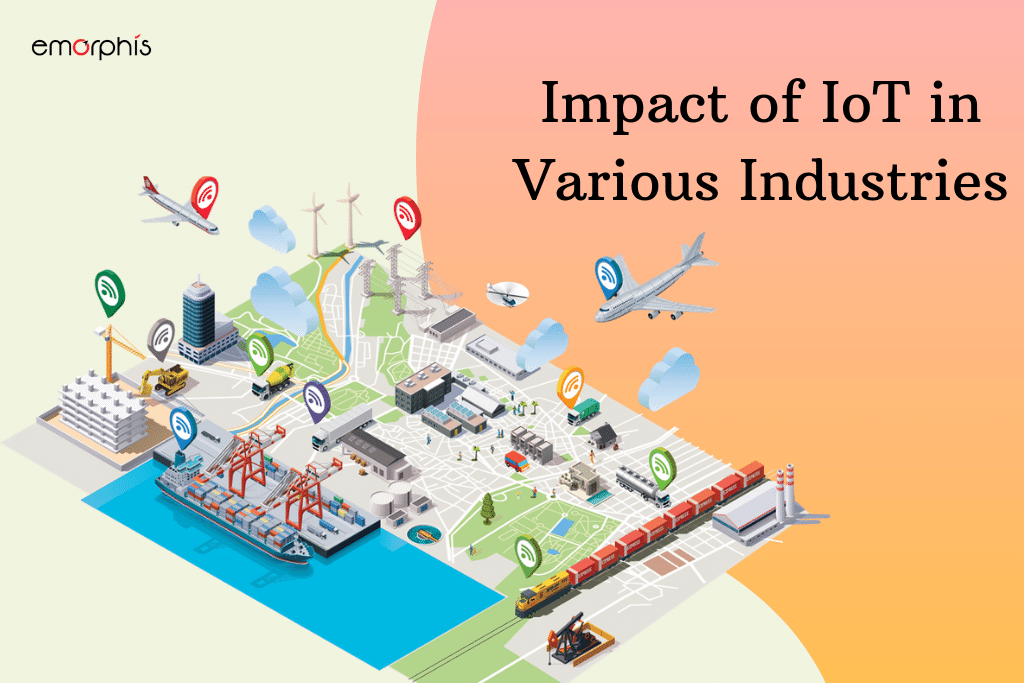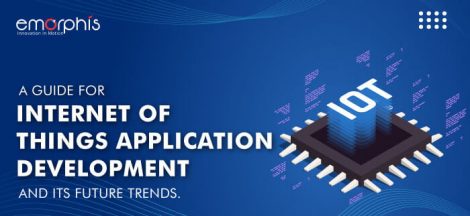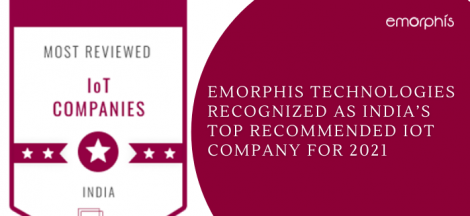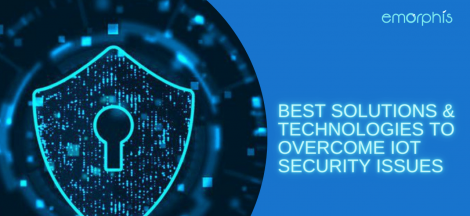When it comes to discussing revolutionary technology, Internet of Things (IoT) is amongst many popular contenders. And why not, the Internet of Things has shown potential use-cases that have the power the change the world for good unless used with bad intentions. The basic principle of IoT application development process is an ecosystem of interconnected physical devices that have the ability to communicate with each other and use data in a more meaningful manner. Thanks to the machine-to-machine technology, the concept of IoT application development has led to better use of data through analysis and smart techniques.
More now than ever, the IoT application development companies are changing the landscape of businesses in various industries. Interconnected devices, sensors, automated controlling and what not! Other than the most popular applications of IoT like smart homes and autonomous cars, there are many other industries that are reaping the benefits of using IoT technology in their functionalities. Let’s dig in a little deeper to learn how IoT is changing various industries today:
Agriculture and Farming
Ever heard the term Precision farming? According to Wikipedia, “Precision agriculture (PA), satellite farming or site-specific crop management (SSCM) is a farming management concept based on observing, measuring and responding to inter and intra-field variability in crops.”
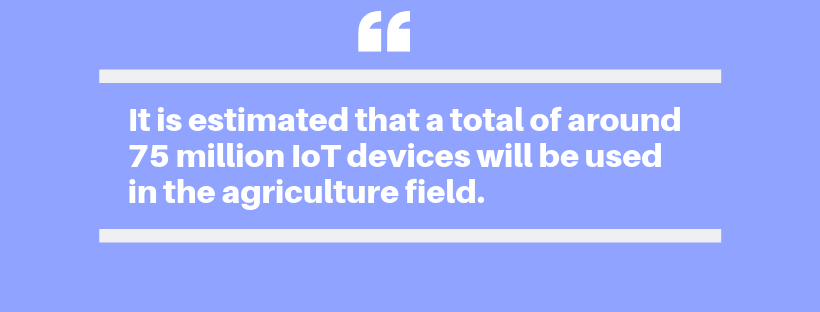
With the introduction of IoT application development framework in the agriculture sector, it has become increasingly easy to monitor crops and agricultural conditions with the help of smart sensors. It is estimated that a total of around 75 million IoT devices will be used in the agriculture field.
By monitoring the soil, weather as well as other important factors of farming, farmers can take more accurate decisions and prevent loss of crops by implementing better safety measures. Latest improvements like farming drones can facilitate farmers to improve their crop production and increase efficiency in their regular working patterns.
Constructions and Asset Management
The multi-billion-dollar construction industry suffers from heavy losses due to dependency on a lot of factors. Heavy machinery and costly equipment if not handled properly turn out to be dangerous and unsafe. IoT solutions can turn out to be helpful in handling such situations. With the help of features like location monitoring, the safety of equipment and machinery can be ensured without even assigning people to work for it.
Moreover, usage patterns and environment safety can also be handled through IoT by monitoring factors like usage hours, temperature etc. while optimizing equipment for their best performance and use.
Retail Industry
According to Statista, The number of retail IoT units in 2017 was 21.6 million which was expected to reach 32.4 million by 2025 as the retail industry takes a major part of driving the economy. The current trend of physical shopping in the e-commerce and retail industry is expected to become history with the growing usage of IoT application development platform. When you visit a store versus an online shopping website to buy something, you might’ve encountered the lack of variants in terms of shopping options. This happens due to a limited amount of physical space.
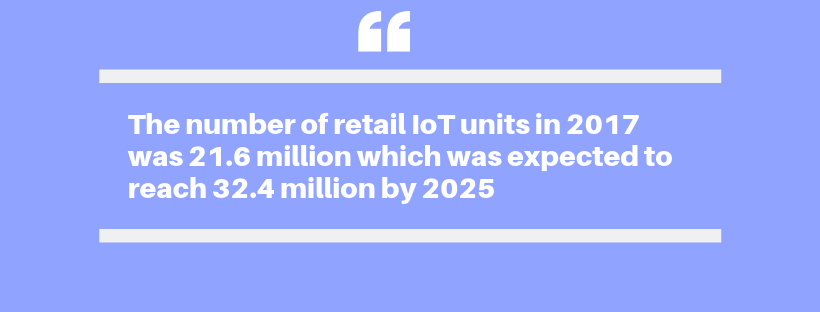
But with IoT, this scenario will completely transform as people will get a chance to experience shopping like they are doing it for real with the help of augmented and virtual reality working in sync. Many big brands are on their way to introducing changing rooms enabled with AR technology so that their customers can try out way more options. Other than fashion taking the lead, IoT application development will facilitate shopping centers and supermarkets as well by helping collaborative farming technologies with accurate supply chains.
The overall output will be low-cost products which are manufactured only according to the customers’ requirement. This, in turn, will save lots of money which is used for food waste management as the supply-demand cycle will be balanced.
Smart Buildings
The IoT technology has already made huge advancements in the construction and real-estate industries and the next step to changing the level comes with Smart Buildings. With smart building technology, commercial buildings, hotels and industrial facilities are all getting a chance to improve and work on priority decisions and growth rather than working on management. As per ABI research, the IoT technology can help to manage and control elaborate buildings with the help of a new gateway which is projected to exceed 64 million units in 2021.
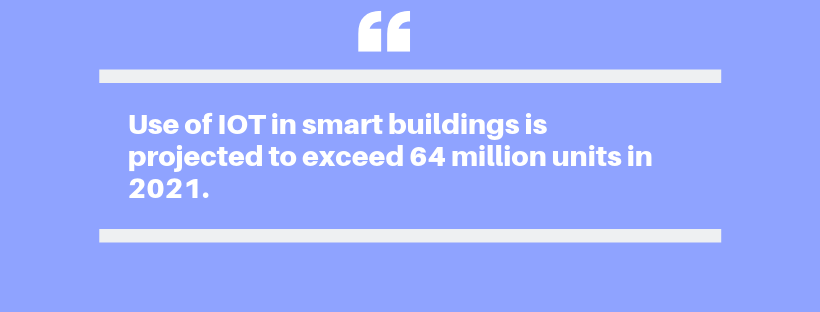
By restructuring all the aspects of a building right from construction to habitation, IoT is turning the business upside down for good. It helps people to make informed decisions and work on optimization strategies. This approach helps in creating a sustainable staying environment, enhanced tenant relationships, and streamline business processes while increasing revenues. Moreover, smart buildings also help in delivering cost-saving options to the occupants.
Hospitality
The hospitality sector is hugely made up of customer experiences and using IoT will help in enriching people’s travel and staying experiences. Hotels have already started using IoT technology for face recognition so as to help the staff to get acquainted with the customer even before they arrive for a stay at the hotel.
Using IoT in the hospitality sector can result in increased revenues and decreased operational costs. For example, using a smart energy management system for controlling the electric supply of a room can save energy consumption for about 20 to 45 percent as it can detect if the room is occupied or empty through sensors. Moreover, such a system could also increase guest satisfaction by allowing the guest to adjust the light and temperature of room through voice interaction.
Other important areas of use are sensors and emotion recognition cameras that allow employees to predict the mood of their guests and provide services accordingly. The same service can be used to provide recommendations to guests as per their personal preferences for hotel rooms and stay. This way, the industry can provide better hospitality experience a personalised services to their guests.
IoT Solutions Advertising
Wearables, cars, smart devices and products are amongst the hottest applications of the IoT technology. The interconnectivity between different devices has led to a lot of new opening doors and channels for the advertisers. Many people in the media industry don’t yet realise what IoT stands for and don’t know that it will soon be a $267 billion business. However, progressive brands are focusing on utilizing even the smallest bits of data from consumer behavior and spending patterns in order to provide better shopping experiences.
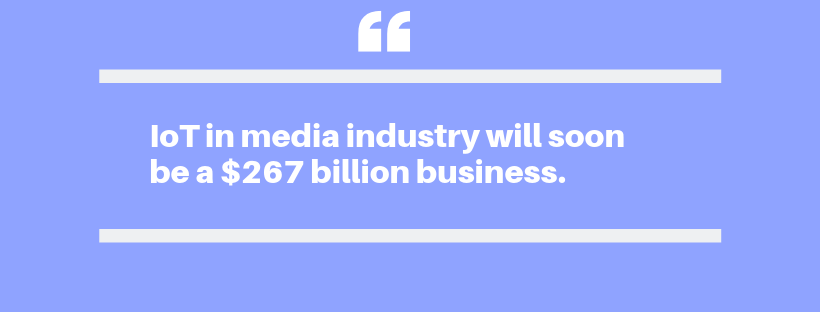
Marketers and advertisers keep a keen eye on influential touch points so as to provide custom-advertising to their consumers for gaining the maximum effect on conversions. Promotional offers and discounts are available on consumers’ fingertips as the marketers study shopping patterns and try to provide exclusive deals that could result in customer retention and increased profits for the business itself.
Application of IoT in Banking Services
Traditional finance systems are now joining hands with technology and the evolution of Fintech application development is leading to a good rate of progress in banking sector. As per reports, IoT in Banking and Financial Services Market will be worth 2,030.1 Million USD by 2023. The applications of IoT technology hold enormous benefits for the finance industry as it has the power to utilize huge datasets which are common in finance.
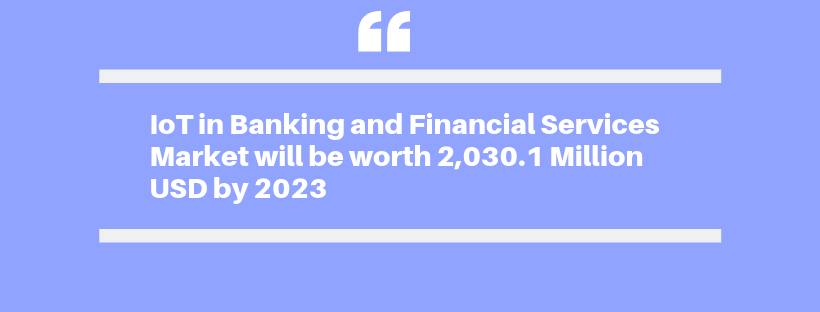
Earlier when transferring money from one person to another consumed time in days, the power of money was in the hands of the banks. But now that people have embraced new technology, the same process is completed merely in a matter of seconds. Connected devices are enabling the banks as well as the consumes to make the most out of technology while managing their financial transactions.
Conclusion:
Interconnected devices and embedded services of the IoT technology are proving to be useful in many big as well as small industries. In fact, interesting use-cases are constantly being explored to utilize huge datasets in the best possible way for discovering new applications that could enhance the existing systems better.
IoT as a technology is an interesting tool for different organizations and industries as it provides opportunities for constantly increasing automation and improving data utilization techniques. With time, the technology is expected to progress at an even higher rate and businesses that understand its value will work towards adopting it in their regular functioning.
However, in order to utilize the full potential of IoT in the future, it is important to realise that improvements need to be made in terms of connecting different devices to a greater degree of accuracy. For IoT to work efficiently, harmony needs to be established between different components such as sensors, edge devices, mobile technology, computers etc.
Resources-
https://en.wikipedia.org/wiki/Precision_agriculture
https://www.statista.com/statistics/691865/retail-iot-units-in-the-eu/
https://www.marketwatch.com/press-release/gateways-power-nearly-every-iot-market-as-abi-research-forecasts-global-shipments-to-exceed-64-million-units-in-2021-2016-10-24-112031211?mod=mw_share_twitter
https://www.hotel-online.com/press_releases/release/7-trends-for-the-internet-of-things-in-hospitality
https://www.forbes.com/sites/louiscolumbus/2017/01/29/internet-of-things-market-to-reach-267b-by-2020/#580dd6ef609b
https://www.marketsandmarkets.com/Market-Reports/iot-banking-financial-services-market-172304505.html



